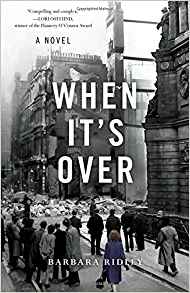When It’s Over
In pre-WWII Prague, Lena Kulkova, who is Jewish, becomes involved with the underground resistance movement, as well as with Otto, a German-Jewish refugee. Lena has a troubled relationship with her strict father and, other than sadness at leaving behind her mother and younger sister, Lena does not look back when she flees her childhood home. Together, she and Otto make their way to Paris and eventually England, where Lena awaits news of the rest of her family, some of whom are still trapped in Nazi-occupied Prague. The couple lives with other friends, also part of the resistance group.
As Otto becomes more withdrawn and more involved in the movement, Lena begins to pull away from him, turning her attentions instead to the nephew of an aristocratic lady of the manor in the English countryside.
Many WWII-era novels are set in the midst of the fighting; it was intriguing, yet heartbreaking, to read about the war from the perspective of those who are safe but whose families are trapped.
Lena is strong-willed and often butts heads with those around her, but she is nonetheless an engaging protagonist. Otto, on the other hand, is less likeable, and at times reading about his political viewpoints bordered on the tedious. Nonetheless, the book held my interest, particularly as it was based on true stories told to the author by her parents. The book is well researched and will likely resonate with those looking for a WWII novel with some politics in the mix.










